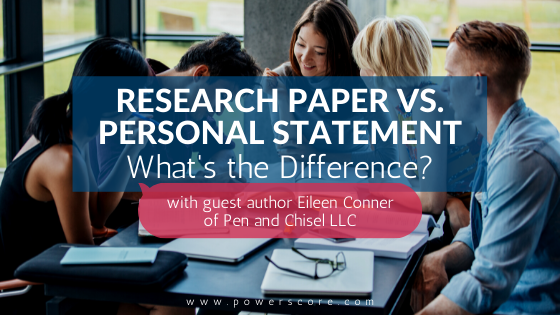This blog comes from admissions expert and founder of Pen and Chisel LLC, Eileen Conner.
After years of working to improve your academic writing, you’re totally prepared to tackle the task of writing a convincing law school personal statement. Or are you?
Actually, the personal statement is substantially different from the typical research paper taught in college. As such, it can present surprising challenges to even the most accomplished academic writer. Let’s take a look at some of the differences between these two types of essays.
Length
One obvious difference between research papers and personal statements is the typical length requirement. Research paper requirements tend to grow longer and longer over the progression from high school to college to graduate school. Students become accustomed to making complex arguments in a wide-open amount of space.
However, when writing the personal statement, the tables have turned. Instead of having 5, 10, or 20 pages to fill with all the details your heart desires, you have only a very short 2 to 3 pages. That is all the space you get to convince the admissions committee at your choice of law school that you should be admitted to their program.
Adjusting to these limits can be difficult if you are used to having plenty of space in which to make a convincing argument.
Topic
A research paper’s topic will center on something outside you yourself — generally a topic of academic research. From poetry to politics and cell mutation to cultural norms, any subject of scholarly inquiry might be your topic.
In contrast, the personal statement is exactly that: personal. It’s all about why you individually should be accepted into the law school program of your choice. This means that the topic of your personal statement must center on you: your actions, your achievements, your ambitions, and your strengths. This very different type of topic requires a very different approach.
Structure
The structure of a personal statement can also differ significantly from that of a research paper. In a research paper, you’ll consider a particular problem or issue, formulate a thesis statement, discuss the evidence that supports (or discounts) that thesis, and come to a well-supported conclusion.
But in a personal essay, you won’t propose a traditional thesis statement. You won’t include the typical paragraphs of evidence and analysis that fill up the body of a research paper. Instead, you’ll need to create a personal narrative that supports your argument for admission to law school. This generally means that you’ll tell a story of a particular time in your life, and use that to show the admissions committee that you’re a great candidate for their program. Needless to say, this narrative structure is quite a bit different than the typical research paper structure.
Evidence and Support
Speaking of evidence, the method of support is also a major difference between these two essay types. Evidence in a research paper is drawn from academic research of some kind. You might include textual evidence from primary or secondary sources, experimental data, statistics and studies, and so forth.
In contrast, in a personal statement, the topic is you. That means — barring the outside chance of you being a figure so notable to have been studied academically in your own lifetime, such as Jay-Z, or a vanishingly rare medical case — you won’t have any written research to cite to support your argument.
Instead, you must draw on your own experiences, actions, and achievements to show the admissions committee you have what it takes to become a successful lawyer. Anecdotal evidence about what you have done when faced with a problem or challenge is the order of the day — and it’s hugely different from academic evidence.
Confront the Personal Statement Challenge!
Because these two types of essays are so different, it’s a good idea to be realistic and expect challenges when approaching the personal statement.
Instead of putting off your writing process to the last minute, counting on your excellent skills in producing research papers to get you through this writing process, consider starting well in advance of your deadlines. This way, you’ll have plenty of time to get over any stumbling blocks that this new and different type of essay might present.
Eileen Conner of Pen and Chisel. Eileen helps law school applicants craft convincing personal statements, diversity statements, and other application essays. A graduate of the University of Michigan MFA program in creative writing, she formerly served as the Senior Editor for Law at Revision Editing.
* This article was orginally published on 1/21/15 on the Pen and Chisel Blog


Leave a Reply